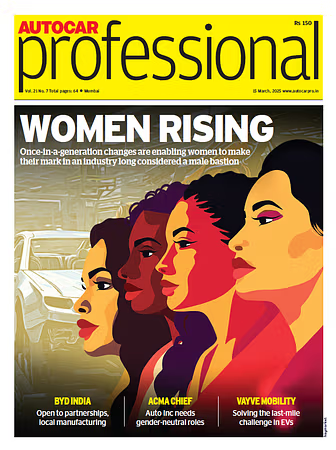JCB unveils hydrogen combustion technology at EXCON
The JCB 3DX hydrogen machine was unveiled alongside the JCB hydrogen combustion engine.
JCB’s £100 million project to produce super-efficient hydrogen engines made its Asian debut today, when the company unveiled its hydrogen combustion technology at EXCON, in Bengaluru.
The JCB 3DX hydrogen machine was unveiled alongside the JCB hydrogen combustion engine. It has been developed to meet carbon emissions reduction targets.
Speaking at the EXCON show earlier today, JCB India’s CEO and Managing Director, Deepak Shetty said: “It is very fitting that this JCB 3DX backhoe loader, powered by a hydrogen combustion engine, is being publicly unveiled in India just as COP28, the UN Climate Change Conference draws to a close in Dubai, UAE. We are proud that India should be the first nation in the world to show this prototype
backhoe loader machine in public.”
He added that the National Hydrogen Mission is creating the conditions for a hydrogen ecosystem, which is essential to the success of hydrogen combustion
technology.
"JCB India is proud to have taken the lead in introducing this technology to
construction equipment in India. This has been made possible because of the vision of JCB Chairman Lord Bamford, who has been the driving force behind the development of machines that are powered by hydrogen," Shetty added.
A team of 150 JCB engineers is working on the pioneering initiative to develop hydrogen combustion engines – and more than 75 prototypes have already been manufactured.
Prototype JCB hydrogen engines are already powering backhoe loader and Loadall telescopic handler machines. Separately, JCB UK has also unveiled it's very own designed and built mobile refuelling bowser to take the fuel to the machines.
JCB’s existing drive to reduce fuel consumption means its diesel-powered machines use 50% less fuel today on average than those manufactured more than a decade ago. This has saved 16 billion litres of fuel – equivalent to 53 million tonnes of CO2.
Prior to the EXCON exhibition, JCB Chairman Lord Bamford had stated, " “India has a real opportunity to put hydrogen at the very centre of its net zero future – it is a clean zero carbon fuel which can be produced from renewable energy. Our machines work long hours, particularly in India, so minimising downtime to recharge or refuel is essential. As such, hydrogen is a perfect solution for India, particularly for the earthmoving sector.”
He further added that Hydrogen combustion engines also offer other significant benefits. By leveraging diesel engine technology and components, they do not require rare earth elements and critically, combustion technology is already well proven on construction equipment.
Shetty concluded, "The transition from diesel to hydrogen will be much faster than
what we think, and JCB India will be ready. Our hydrogen combustion technology is already well- developed; many machines are currently under test, and JCB is the first construction equipment manufacturer to have unveiled working hydrogen combustion engines, and prototype machines powered by such engines."
RELATED ARTICLES
JBM Auto's Chief Human Resources Officer Girish Goyal Steps Down
Goyal indicated his intention to pursue career opportunities outside the JBM Group in his resignation letter.
“We Are Here to Stay”: Nissan Reaffirms India Commitment Despite Exit from mfg JV
After ceding control of RNAIPL to Renault, Nissan says its most significant push in India is just beginning.
Nissan Bets Big on India with €700M Investment, 6 New Models — But Will Renault’s Control of Manufacturing Limit Its Ambitions?
The company has set itself a very tall target of producing and selling 2 lakh units by the end of the next calendar year...






 By Autocar Professional Bureau
By Autocar Professional Bureau
 12 Dec 2023
12 Dec 2023
 13999 Views
13999 Views





 Arunima Pal
Arunima Pal




